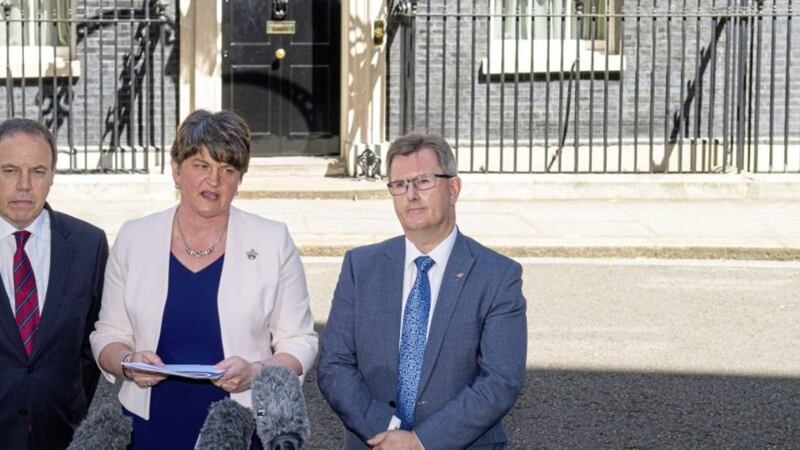The DUP has been credited with forcing the government to drop the UK’s one per cent public pay cap, after warning the Tories it would support a Labour motion for the cap’s removal on police and fire officers. The DUP then backed separate advisory Labour motions on NHS pay and tuition fees. An emerging realisation that the DUP and Labour will do business is one of the most fascinating developments at Westminster, allowing the unionists to keep the Tories on their toes. The pay cap move will have been partly provoked by last week’s insistence from a ‘Treasury source’ that the £1 billion DUP/Tory deal will only be released under devolution. This is believed to have been an attempt to use the DUP as a football in games between Numbers 10 and 11. Instead, the DUP turned around and kicked them both. Alas for the DUP, its pay cap success cannot be extended to Northern Ireland because there are no devolved ministers to apply it. The Police Federation has called on Secretary of State James Brokenshire to give its members a pay award, adding to the growing chorus of calls for little acts of direct rule.
**
Approval for a council waste incinerator in the hills above Glengormley is not a little act of direct rule - it is the planning system running on autopilot, as Sinn Féin left it. Sinn Féin is now calling the decision a “disgrace” but officials at the Department of Infrastructure have no choice but to accept the verdict from the Planning Appeals Commission (PAC) because their last minister, Sinn Féin’s Chris Hazzard, declared himself “neutral” on its outcome. Hazzard now claims he had to make that declaration because “as final decision maker I was protecting the integrity of the PAC process”. This comes perilously close to implying that ministers protect integrity by temporarily misrepresenting themselves.
The Glengormley site is certainly less than ideal. However, the project had a perfect location on Belfast’s North Foreshore, until Sinn Féin councillors opposed it at the very last minute in 2009 because the party had jumped on an anti-incinerator bandwagon in Dublin and had to make an “all-Ireland policy” of it. Every other party on Belfast City Council then rolled over at the first sign of controversy. The Dublin incinerator opened this year.
**
The limit of what officials can do on their own initiative has been demonstrated elsewhere at the Department of Infrastructure, where a public consultation exercise has been launched into a European Directive on vehicle testing. It usually requires a minister to start a consultation but if it is not begun now, the directive cannot be put into law by a Brussels deadline next May and parts of MoT system could grind to a halt.
Officials have justified action on the grounds that they are not making a decision but merely: “ensuring that sufficient time is allowed to provide for the legislation to be approved by any future minister and laid before a future assembly.” It is all very Yes, Minister - or in this case, no minister.
**
Officials at the Department of Infrastructure were able to use their own initiative to make a 25-minute video for this Wednesday’s Cycle to Work day, showing two colleagues commuting from north Belfast, one by car and one by bike. The cyclist won, although the green message was somewhat spoiled by both finishing in the department’s city centre staff car park. Perhaps an end to that expensive perk would prove more inspiring.
**
Among the many absurdities of the Red Hand Commando’s bid for legalisation is that it went to London by mistake. It should have asked to be de-proscribed by the Northern Ireland Office, not the Home Office.
Confusion may have arisen because the Terrorism Act 2000 set up a Proscribed Organisations Appeal Commission. This can review de-proscription refusals from London or Belfast but it is based at Her Majesty’s Courts and Tribunals Service in London and most references to it presume a referral from the Home Office. Still, it was a bit of a schoolboy error to make when the Red Hand Commando was acting on advice from the Loyalist Communities Council, founded in 2015 with the help of Jonathan Powell, who was Downing Street’s chief of staff when Labour passed the Terrorism Act.
**
This week began with a very silly story about the DUP/Tory deal. It was widely reported that anti-Brexit campaigner Gina Miller had won a “legal challenge” requiring the deal’s £1 billion to be approved by parliament - recalling her victory last year in forcing a Commons vote on triggering Article 50. However, there was never any question that parliament would have to approve the £1bn - approving spending is parliament’s original and most basic function. The government merely replied to a letter from Miller’s solicitor confirming the blindingly obvious. Legal experts poured scoured on Miller and the daft headlines she had garnered but of course, if garnering headlines was the point, she was not daft at all.
newton@irishnews.com









